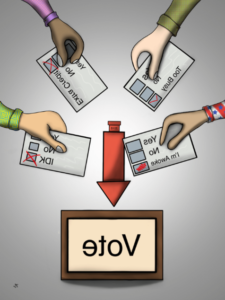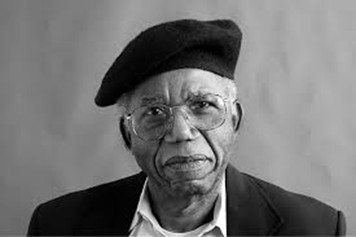2nd PUC English Question and Answer – The Voter
Looking for 2nd PUC English textbook answers? You can download Chapter 12: The Voter Questions and Answers PDF, Notes, and Summary here. 2nd PUC English solutions follow the Karnataka State Board Syllabus, making it easier for students to revise and score higher in exams.
Karnataka 1st PUC English Textbook Answers—Reflections Chapter 12
The Voter Questions and Answers, Notes, and Summary
2nd PUC English Chapter 12
The Voter
Scroll Down to Download The Voter PDF
Comprehension I.The Voter
Question 1.
Roof was a popular young man because
(a) had not abandoned his village.
(b) want to guide his people.
(c) was forced to return to his village.
Answer:
(a) had not abandoned his village.
Question 2.
Why was Marcus considered rich and powerful?
Answer:
Marcus belonged to the ruling party and was the Minister of culture. Nobody could think of opposing his leadership. He had two big cars and a bungalow called Umuofia Mansions and offered the people a grand feast. So, he was considered rich in Umuofia.
Question 3.
Marcus Ibe had earlier been?
(a) a doctor.
(b) a school teacher.
(c) a politician.
Answer:
(b) a school teacher.
Question 4.
The fact that Marcus Ibe left the good things of the capital and returned to his village whenever he could, shows,
(a) his devotion to his people and love for the place.
(b) he enjoyed all the comforts of the city in his village.
(c) he wanted to improve the amenities in his village.
Answer:
(b) he enjoyed all the comforts of the city in his village.
Question 5.
After the feasting was over the villagers.
(a) praised Marcus’s faithfulness and generosity.
(b) intended to demand more for their votes.
(c) realized Marcus’ wealth.
Answer:
(b) intended to demand more for their votes.
Question 6.
The ‘whispering campaign’ is
(a) secret campaigning at night.
(b) bargaining votes.
(c) clandestine distribution of money.
Answer:
(c) clandestine distribution of money.
Question 7.
The village elder Ezenwa, tilted the lamp a little because
(a) he could not see properly.
(b) the place was too dark.
(c) he wanted to confirm the amount paid to each.
Answer:
(c) he wanted to confirm the amount paid to each.
Question 8.
“Firewood” refers to
(a) Roof taking advantage of the situation.
(b) the advantages of being a voter.
(c) the benefits the elders received.
Answer:
(b) the advantages of being a voter.
Question 9.
Roof and the leader of the POP campaign team were
(a) friends.
(b) strangers.
(c) known to each other.
Answer:
(c) known to each other.
Question 10.
Roof was mesmerized by
(a) the red notes on the floor.
(b) the picture of the Cocoa farmer.
(c) the POP campaign leader.
Answer:
(a) the red notes on the floor.
Question 11.
Roof’s act of inserting the torn ballot papers in two boxes signifies
(a) keeping his promise.
(b) appeasing Iyi.
(c) absolving himself of his guilt.
Answer:
(a) keeping his promise.
Comprehension II.The Voter
Question 1.
Trace the change in the attitude of the villagers before the second election. Give reasons.
Answer:
The villagers, initially innocent, began to notice the wealth that their leader, Marcus, had accumulated over five years. He had acquired luxury items such as cars and bungalows, as well as a private power plant for his home.
Observing these changes made them realize that their free votes could lead to financial gain for Marcus, prompting them to shift their attitudes and seek ways to benefit financially from the electoral process.
Question 2.
What was the justification for the formation of the POP?
Answer:
The “Progressive Organization Party” (POP) was established by the coastal tribes to protect themselves from complete cultural, political, social, and religious oppression. They aimed to preserve their culture and sustain their religious practices in the face of external pressures.
Question 3.
The Roof is an intelligent manipulator. Justify the story.
Answer:
The Roof was a strong, intelligent individual and a loyal follower of Marcus. He had a keen sense of the villagers’ sentiments leading up to the elections, which allowed him to relay crucial information to Marcus. However, when the POP campaign leader bribed him with five pounds for his support, he found himself torn between allegiance to his leader and the opposition leader, Maduka.
Ultimately, in the voting booth, he cleverly compromised by tearing the ballot paper in half, casting one half for Maduka and the other for Marcus. Despite his personal conflict, he ensured that the villagers still voted for Marcus, demonstrating his manipulation and loyalty.
Comprehension III.The Voter
Question 1.
The POP campaign leaders’ meeting with Roof shows the misuse of transparency in a democratic setup. Discuss.
Answer:
Democracy can sometimes lead to corruption, as evidenced by the POP campaign leader bribing Roof with five pounds. This situation highlights the lack of transparency within the democratic system, where candidates often resort to bribery to secure votes.
In such cases, currency takes precedence over the actual value of a vote, essentially turning elections into a transaction rather than a fair choice. To restore integrity, the electoral process needs significant reform.
Question 2.
“To every human comes a time of reckoning.” How does Roof’s dilemma on the day of the election reflect this?
Answer:
Roof’s dilemma symbolizes the broader struggle faced by those who accept money from candidates, representing ordinary people seeking to improve their livelihoods. His internal conflict reflects a universal moral quandary: accepting a bribe isn’t strictly condemned but is also not entirely justified.
This system perpetuates wealth disparity, with the rich benefiting from corruption, while individuals like Roof, who accept small bribes, are caught in a complex moral grey area that makes it difficult to label them as criminals in the eyes of social justice.
Question 3.
What comment on the electoral system does the story offer? Is it relevant?
Answer:
The story critiques the current electoral system, indicating that it lacks transparency and often prioritizes monetary influence over genuine democratic choice. To improve the electoral process, citizens must advocate for reforms that ensure fair elections. This message remains relevant today, as it emphasizes the collective responsibility of citizens to demand integrity within their democratic institutions.
Question 4.
“Democracy is more than holding elections regularly.” Do you think the story supports this statement?
Answer:
Yes, 1 agrees with the above point.
The Voter Additional Questions and Answers
Question 1.
What was the popular name of Rufus Okeke?
Answer:
Roof
Question 2.
Where was Roof born?
Answer:
Umuofia
Question 3.
Who was the chief follower of Marcus?
Answer:
Roof
Question 4.
Which is the party of Marcus?
Answer:
People’s Alliance Party (PAP)
Question 5.
Which is the Opposition party of Marcus?
Answer:
Progressive Organisation Party (POP)
Question 6.
Whom did the people support much in the election?
Answer:
Marcus’ (PAP) party.
Question 7.
What is the name of Marcus’s newly built house?
Answer:
“Umuofia Mansions”
The Voter Summary
The Voter is a short story by Chinua Achebe that examines the complexities of democracy in newly independent Nigeria, highlighting both its benefits and drawbacks. Achebe illustrates how political leaders exploit the Igbo people, enticing them with small bribes for their votes and using innocent village youth to influence the electorate.
Rufus Okeke, known as Roof, is a respected figure in Umuofia. While other young men have moved to the city for work, he stays behind to guide the naive locals. His former neighbour, Marcus, has become the Minister of Culture after winning an election with the People’s Alliance Party. Confident in his re-election chances, Marcus perceives no serious opposition in the village.

Roof acts as Marcus’s right-hand man, adept at sensing villagers’ moods. He warns Marcus that people are questioning his questionable academic credentials. Once a missionary teacher, Marcus has amassed wealth, including luxury cars and a bungalow, while living in a village lacking basic amenities. To celebrate his new home, Marcus hosts a lavish dinner party, impressing the villagers but also making them more aware of the power of their votes.
As Marcus prepares for the election, he discreetly distributes money to the villagers. Meanwhile, the opposition party, the Progressive Organization Party (POP), bribes Roof to vote for their candidate, Maduka, threatening him with a voodoo curse if he refuses. Caught between loyalty to Marcus and fear of the POP, Roof accepts the bribe.
The story’s climax occurs when Roof enters the voting booth. Torn between his allegiance to Marcus and the pressure from the opposition, he creatively resolves his dilemma by tearing the ballot in half, casting one for Maduka while announcing his vote for him and the other for Marcus. Through Roof’s internal conflict, Achebe captures the psychological duality faced by voters in contemporary society.

